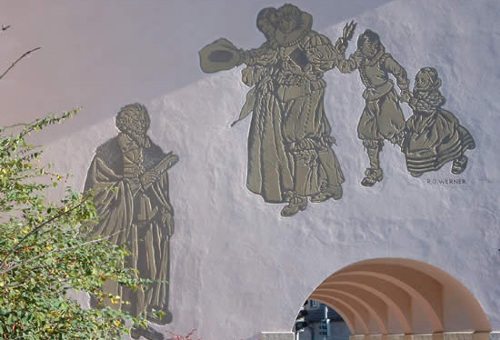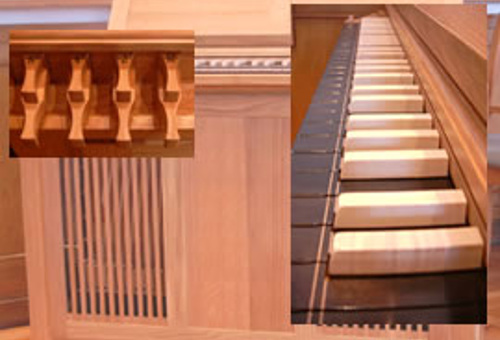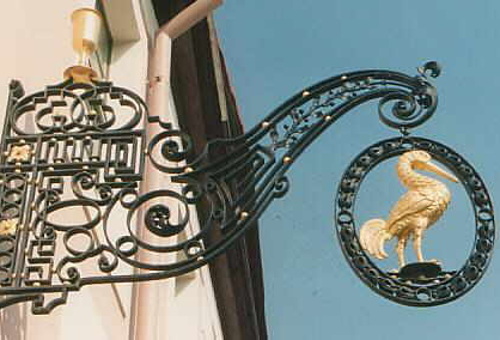




Forschungs- und Gedenkstätte im Geburtshaus des Komponisten
Heinrich-Schütz-Straße 1
07586 Bad Köstritz
Telefon +49.36605.2405 und 36198
Fax +49.36605.36199
Web: www.heinrich-schuetz-haus.de, www.heinrichschuetz.com
E-Mail: info@heinrich-schuetz-haus.de
Dienstag bis Freitag 10.00–17.00 Uhr
Samstag und Sonntag 13.00–17.00 UhrAm 8. Oktober 1585 erblickte Heinrich Schütz in Köstritz „eine Meile Weges“ von Gera das Licht der Welt. Aus Anlass seines 400. Geburtstages eröffnete man 1985 im Geburtshaus die „Forschungs- und Gedenkstätte Heinrich-Schütz-Haus Bad Köstritz“. Das Museum zeigt eine Ausstellung zu Leben und Werk des ersten deutschen Komponisten von internationaler Bedeutung sowie seinem kulturgeschichtlichen Umfeld. Mit der Eröffnung des Museums begann die Tradition der jährlich stattfindenden Köstritzer Schütz-Tage in der ersten Oktoberhälfte. Heute feiern wir diese Festtage als Mitteldeutsche Heinrich-Schütz-Tage in Zusammenarbeit mit dem Schütz-Haus Weißenfels, der Dresdner Hofmusik unter Regie der Ständigen Konferenz Mitteldeutsche Barockmusik in Sachsen, Sachsen-Anhalt und Thüringen e. V. (MBM), mit zahlreichen Konzerten, einem Kolloquium und dem traditionellen Festumzug am 8. Oktober.
Konzerte und Hausmusiken, Kurse und Seminare, Sonderveranstaltungen und Schlossfeste, Wanderausstellungen und Kolloquien, Kurse für Alte Musik, Musizieren mit Kindern und Erwachsenen sowie Wechselausstellungen in der Schütz-Haus-Galerie gehören zum Jahresprogramm des Hauses. Für Schüler jeder Altersklasse hält das Museum ein umfangreiches museumspädagogisches Angebot bereit.
Deutschland verfügt über musikalische Traditionen und Nachlässe von außerordentlichem Wert: Händel, Schütz und Bach, Beethoven, Mendelssohn, Schumann, Brahms und Wagner sind - um nur einige Namen zu nennen - weltweit bekannte und geschätzte Komponisten. Ihr Wirken hat eine einzigartige Musiklandschaft wesentlich mitgeformt.
Zahlreiche Orchester, Chöre und Ensembles, renommierte Musikfestivals und -reihen, Musikerhäuser mit Museen, öffentliche Archive und Bibliotheken, aber auch private Sammlungen bewahren ihr musikalisches Erbe.
Diesen unschätzbaren Fundus gilt es immer wieder neu zu beleben und für die Gegenwart zu erschließen. Den in der Arbeitsgemeinschaft Musikermuseen Deutschlands zuusammengeschlossenen Häusern kommt dabei eine wichtige Rolle zu. In ihnen begegnen wir dem Werk von Musikern und Komponisten, die die Kulturnation Deutschland außerordentlich bereichert haben. Über das individuelle Portrait, über die Vermittlung des einzelnen Œuvres hinaus tragen die Musikermuseen aber auch zur Pflege musikalischer Tradition insgesamt bei. Die vorliegende Broschüre unterstreicht diesen Aspekt der Zusammenschau, und sie lädt zu einer Reise in die Musikgeschichte Deutschlands ein. Ich wünsche diesem Reiseführer regen Gebrauch und eine große Resonanz.
Bernd Neumann, MdB
Staatsminister bei der Bundeskanzlerin
Der Beauftragte der Bundesregierung für Kultur und Medien
Zitat: Vorwort zur Broschüre der Arbeitsgemeinschaft "Musikermuseen in Deutschland", 2007.